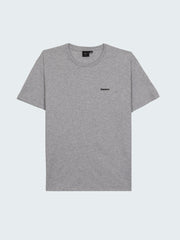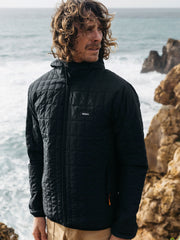Back in 2005, we made a unanimous decision to place wool at the centre of our fabric development. One of the oldest natural fibres known to man, its functional properties are well known and it’s why you’ll find it throughout much of our range.
Lesley Prior On Our Bowmont Merino Flock
10.13.16
4 min read
Two years of detective-like research eventually led us to Lesley Prior, the guardian of the last twenty-eight Bowmont Merino sheep on the planet.
Lesley is a force to be reckoned with. Her knowledge of all things wool is not to be challenged, nor is her passion or devotion to the Bowmont flock which she guards. We make sure we’re always in touch so we know how the sheep are faring and what to expect from the next batch of wool, but also because Lesley is a vital part of the Finisterre family. We caught up with her and talked all things wool ahead of her talk at our London flagship for Wool Week 2016.
What has evolved when it comes to the Bowmont Merino flock since Finisterre started working with you?
We have grown numbers and imported new genetics from Australia several times to improve the wool. We are now members of the Australian Superfine Wool Growers Association – something only the finest flocks in Australia belong to. That’s a mark of how far we have come in 12 years.
Where do you see the Bowmont Merino flock growing to in the next few years?
We shall be growing each year – to what point depends on health and strength of the shepherd! Probably around 1000 sheep is the right size for us – but we need to ensure we can maintain our current very high Welfare standards so would need to increase our current help. We shall be continuing the development work with our partners in Australia. The science side of wool physiology really fascinates me. We are importing new genetics each year to produce even better wool and sheep but we also freeze genetics regularly in case of disasters like Foot and Mouth. We hope to begin exports to Europe in the next year or so. We’ve had the highest Export Health Status here since day one – really important because taking good care of sheep health just makes sense in all ways. Looking after our sheep is good for them, good for us and good for our environment.
How many sheep are we at now?
We should have about 350 after lambing next spring.
What is your day to day routine like at the farm?
Depends very much on the time of year. In the winter we house the sheep and goats when it’s very wet to avoid damaging our land. The animals prefer being inside a warm cosy barn to paddling about in muddy fields. This is great for them of course, but means hard work for us. We must make sure they have clean bedding and feed at least twice a day. Sometimes 3 times a day. 500 animals are fed by trucking wheelbarrows full of heavy silage up and down feeding racks. It’s tough physically. At lambing time that work must continue PLUS we have all the extra work of helping lambs into the world and looking after those precious young lives and their mums. It’s a 24/7 job then. In summer the work is different. Outside 2 or three times a day checking every animal, vaccinating against disease, checking fences and boundaries, dealing with any issues, then harvesting our grass for winter food, cleaning out the barns, grading and quality checking the lambs and their wool. Shearing takes place several times a year in groups. Animals are shorn on the Australian system. That is – when the wool is the right length – not according to the time of year. We grade animals according to their wool so much careful assessment of each animal goes on all year.
How important is educating people about wool? How can we do more?
I think Finisterre already do a great job telling their customers about wool and Merino in particular. We need to keep this going because wool is such a fantastic resource. It’s sustainable and tremendously versatile. It’s the original “green” fibre – growing as it does on grass.
Innovation has played a key part in the Bowmont Merino process - how can others follow suit?
By thinking outside the box. Don’t take No for an answer and keep learning from the past but always looking forward. Cliches maybe but they are all valuable.
We’ve been talking a lot about British manufacturing - what is it about producing / farming wool in the UK that makes it so special?
The simple answer is Traceability. Everything is close here. Grower (Me), Processor, Retailer – all just a few hours from each other. Close enough to meet and talk face to face. That builds trust.
















































































